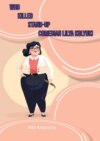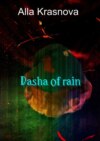Read the book: «Be a writer»
Illustrator Иллюстрации ZAP
© Alla Krasnova, 2025
© Иллюстрации ZAP, illustrations, 2025
ISBN 978-5-0067-2878-3
Created with Ridero smart publishing system
Writer and Motivation
A writer can do just fine without external motivation, because he always has an inner motivation, he is born with it. Therefore, it is not necessary to motivate the writer specifically, he will write anyway. We don’t get paid – we write, we don’t win contests – we write anyway. We write even when it’s at a loss to us (expenses for proofreaders, editors, high-quality covers and art).
A writer feels that when he writes, he feels better. A writer feels that when he writes, he is involved in something important. Because «living and writing is easier than living and not writing.» These are the words of a participant in the literary contest «Debut», which took place many years ago, but I still remember these words, because you can’t be more precise.
Let’s add here that unrealized talent turns into a disease. Therefore, writing is often a vital necessity for a writer. In an interview, D. Dontsova said that either her grandfather or someone else just wrote everything by hand in a notebook. When asked, «Why are you doing this?» he replied, «Otherwise I’ll get sick.»
Of course, a writer has stops and breaks, and they should be, but anyway, all writers write because they want to write. It’s not for the sake of becoming famous or making money, we just want to live. To live is in such a full sense, which is understood as happiness (and happiness can also be a test).
But whether you need to expose yourself to external motivation is a big question. Let’s remember our Lev Nikolaevich with his «if you can’t write, don’t write.» That’s what it’s about here. The true meaning of this statement by Leo Tolstoy may escape the reader (read the writer), because this is an abbreviated version of his expression. Entry in Count Leo Tolstoy’s diary dated October 19, 1909: «If you really want to write, then only when you can’t help but write.» Let me decipher it again: you don’t need to additionally stimulate yourself with the buns of external motivation, because the future work that the author has inside must undergo several degrees of purification before it finds a way out to the reader.
External motivation often harms a writer because his inner intention does not have time to mature, and if the energy of the idea has already bubbled and is on the rise, then it does not have time to settle down. In one case, we get raw material, in the other – literature on neurosis. The writer does not need either option, because it is a lost work or a work of poor quality. So it’s better to do without external incentives. Let the writer write only when he is ready for it. He will understand it without prompting, he will feel it, and immediately there will be time for writing, and a place, and everything else. You’ll see.
Copying in writing
If a writer copies another writer, then it’s not a big deal for the other writer (as long as it’s not plagiarism, but an attempt to be similar). It’s not terrible for the writer who copies someone, if it’s a moment of apprenticeship. At the initial stage, the writer often copies someone, and then comes to himself. We can call this copying imitation, he’s just learning. If a writer is constantly copying someone, then this is a problem, but we’ll talk about this later.
A much more interesting and difficult case is when the author begins to copy himself, copy his past works. In most cases, this happens in the twilight of the author’s ignorance, but only for the reason that the author does not want to realize it.
Why it’s bad.
This is bad because the author, by copying himself, his past works, deprives himself of the chance to update, which should happen periodically.
The author’s works are based, among other things, on the energy of discovery, the author is always discovering something. Everyone discovers their own, it depends on the vector of internal development (we are all different).
The problem with copying oneself is that the author does not see this problem. How can the author understand that he has begun to copy himself?
The first thing that should alert the author is the agony of the process, the torture. Writing is hard. The work seems to be quite good, but for some reason it doesn’t work, it’s stalling, it doesn’t seem to want to be written. You have to face the truth and ask yourself questions: «Maybe this has already happened? Am I repeating myself?»
Vulnerability of the text
Any artistic text is vulnerable when it is not closed. How can you make the text less vulnerable? I think it’s air tightness. The tightness of a text is when it is self—contained, that is, it has a certain integrity that accommodates the whole world. And the worlds can be different: both more complicated and simpler.
The more the text seems to be on its own, in other words, it will be itself, the better. The originality and autonomy of the text governs. Well, you know, as psychologists usually tell their clients now, be yourself, that’s what we’ll apply to the text. Let him be himself, and this will protect him from destruction, both external and internal. The text may look light, clumsy, «stingy» on the outside, but if it is closed, if there is a feeling that it is «in the house», then you will not break into it. You may like him or dislike him, but he is, he exists, and that’s how he is.
Another word that can be the key to wholeness is harmonious. And what is harmonious? This is consistent, this is when each part of the test is negotiated with the next one in order to then obey the general idea (form). Yes, an idea is a formative factor.
So, the tightness of the text gives integrity. Even a lightweight text with integrity is practically not vulnerable.
Expiration date of the book
Not only does food have an expiration date, but books also have one. For example, we buy cottage cheese in a store, and the expiration date is written on the package in small print (sometimes very small). The books we buy don’t have an expiration date written on them, but it’s there too, and sometimes I think it should be written. It would be fun, at least, and, at most, would save many readers from disappointment. It’s easy to get poisoned by a book, so don’t read something that doesn’t suit you. Have you ever noticed that what you read sometimes makes you feel sick? This happens not only because of the indigestible content. It often happens that the book is not bad, but the expiration date is out. Some works will last more than a hundred years (or even two hundred), and some will not last even two years, will deteriorate, and will become irrelevant. But it’s not bad, it’s the way it is, all kinds of works are needed.
I recently found my old USB flash drive and decided to see what was in there. My early works were there. I was most interested in the book of fairy tales, with a volume of almost 12 author’s sheets (this is a lot for fairy tales, the writers will understand).
The fairy tales were divided into blocks, they had a table of contents with page numbers, and the most amazing thing was that they were proofread in such a way that even when reading slowly, I found almost no errors (!). It’s not typical for me, but then I tried very hard. Ten years ago, I sent them to publishers, but, of course, there was no result.
So I started thinking about what to do with them now. To publish as one book or to publish individually only those that I like the most. Anyway, I walked around them in circles for about a week, and then I made a verdict: they are morally outdated. Yes, my fairy tales couldn’t stand ten years of storage. This does not negate their value for me as an author, but I no longer want to publish them.
How do you feel about your early works? Can you specify their expiration date? And is there an eternal literature at all, for all time?
A question about time
«How long have you been writing this book (work)?» – this question is capable of baffling any writer, because it is not clear how to count. If we count the purely technical part, then we get one figure, and if we add to this the time for «thinking» that was before, then this figure is completely different. And if you understand that the work begins long before the author begins to think specifically about it, then you can completely lose the answer.
In addition, the authors of large works also like to start with short works, outline something in one story, then in another, and then write a full-fledged novel where all these ideas will be developed. Are we going to take into account these stories that were before the novel or not?
Or, let’s say the author wrote a novel, but was not ready to show it to the world, he had this novel on his shelf for five years, then the author matured to expand it to a new level. Are we going to include these five years of downtime in the time frame of writing a novel? For example, everything counts with me. Even if the author did not deal with this novel specifically, the work was going on anyway, he was secretly thinking about it, and at some point the energy accumulated, the author matured.
In general, it is very difficult to count the time spent working on a work, because the work of a writer is not limited to a purely technical part. What is the technical part? It’s just a whoosh, and that’s it, I wrote it. If there is something to write, it will be easy to write. The main work does not take place on paper, but in the writer’s soul, and only then is it fixed by consciousness and transferred to paper.
Many authors gracefully evade the issue of time and are doing the right thing. I’ve often heard writers respond like this: «You could say I’ve been writing this book all my life.»
What do you think, dear writers?
The key to the work
Entry into the work is carried out through the author’s strong side. If the entry into the work does not occur, then the author slides along the top edge, but does not sink inside.
This problem has become very relevant due to technological progress: artists with ready-made covers have entered the market. Previously, this problem was not so relevant, because most authors first came up with a story, then the story unfolded, and only then the cover was applied to this story. That is, the cover went to the finished text.
There are a lot of ready—made covers now, so more and more writers will follow the path of not «text – cover», but «cover – text». And let’s see what happens: the author sees the cover, he likes it, he begins to fantasize (or puts it on his spontaneously conceived idea), gives a name, the artist writes the name on the cover in a beautiful font, the work is paid for. That’s it, the author is happy. And then the author tries to tell this story, which until recently shone so brightly in his brain, but somehow it’s not the same, it comes out dimly. This is all because the author is sliding on the edge, well, like on an eggshell, but you need to get inside in order to live this story from the inside. I called the article «The Key to the Work,» although it would be more accurate to say «The Door to the Work.»
Entry into the work is carried out through the author’s strong side. The author’s strong side forms the door through which one can enter the work, like a house.
The author’s strong point can be anything. I believe that it is not necessary now to write platitudes and give examples of the strengths of the authors, so that the authors do not get caught up in this. After all, sometimes the author’s strong point turns out to be in the most unexpected things. The only problem is to figure it out, because the authors prefer not to notice their strengths. Usually the authors notice that? What they do the worst is because there are problems and stops associated with it. And the strengths escape the author’s attention, because everything turns out easily and naturally.
And yet: the author must have a strong side.
Obstacles that the author creates for himself
In the creative process of a writer, especially a beginner, there is a stage that can be described as «but we suffer anyway.» The essence of this stage is that the author chooses the most inconvenient and unprofitable way of writing a work.
For example, the author of the psychotype is a «lark», and writing at night is extremely inconvenient for him. Nevertheless, at this moment he puts a glass of weak tea on the table, turns on a dim lamp and, overcoming fatigue and pain, begins to create.
It’s hard for him, his eyes are closing, his thoughts are confused from fatigue, but he strives to walk this path.
Why is this happening?
Because writing is closely linked to asceticism and a special mission, these are the features of our mentality and Russian character. But for some reason, the author associates this asceticism with choosing the most inconvenient way for him. You know, it’s like a situation where the desire to accomplish a feat has been lifted, but the space for the feat has not been opened. So the author is trying to commit it in the wrong place. He has not yet accumulated material that is worth such an effort, but the author still makes these gigantic efforts through obstacles erected by himself. Maybe the author trains in this way? Maybe.
In any case, the author often creates obstacles for himself that he wants to overcome. And only after he pushes himself to the limit will he calm down. And only after passing this test will he allow himself to create according to a convenient individual schedule and in a way convenient for himself.
How to save creative energy
A creative resource, like any other resource, is limited, that is, it has its limits. I would roughly divide the authors into two groups: those who have a lot of creative energy, and those who have a little of it. This is a given that is determined by nature: someone has more, someone has less, and nothing can be done about it. You just have to take it for granted. I belong to the second group, and I don’t have much energy.
Those who do not have as much energy as they would like should take more care of their resources, otherwise they may encounter problems. Everyone has the right to make mistakes, but we, who don’t have that much, have less of that right.
How can we minimize the number of mistakes and save creative energy?
Rules developed based on your own experience will help you reduce the likelihood of mistakes and use the resource efficiently.
Authors with a lot of energy can afford to create without regard for the rules. But we, the representatives of the second group, simply need them.
What needs to be done to make these rules appear?
First, you should observe yourself and identify patterns that will help you avoid wasting energy. You don’t need to create a lot of rules – just one or two are enough to avoid becoming a hostage to them. A maximum of three.
I have only one rule, which I have already mentioned. Watching myself, I noticed that overloads negatively affect my work. Therefore, if I write, my daily allowance is no more than an hour. Even if I want to write more.
The individual characteristics of each author form the rules of his writing activity.
Tell me your secret name, the author
Of course, there is an ironic connotation in the title of this article, but in general the topic is quite serious and deep. I’ve been thinking about this for a long time.
The fact is that each of us has our own style, our own methods of working on a literary work, our own way of presenting material, and these individual characteristics characterize us.
I recently looked into a group of stand-up comedians, and I liked how they called themselves by the way they presented their material. There were, attention: a hidden cobra, a striking panda, a flowing mantis and others. Which name do you think I liked the most? Of course, a smooth praying mantis. I am not familiar with the author’s work, I liked only the image created by these two words.
However, humor prevails in all this, but why not take this topic seriously and really reveal your secret name? It is secret, in general, only because it does not lie on the surface, and the author himself does not recognize it until he thinks about it.
What would you call yourself, dear authors? What individual characteristics would be fixed in your name?
At different points in my life, if we consider it in relation to creativity, I would characterize myself in different ways. But now I’m giving myself a rather modest description – a catcher of intonation. This is my secret name, which reflects very well the specifics of my working methods.
I will be glad if you tell me your name in the comments. Shall we get acquainted?:)
The free excerpt has ended.



















